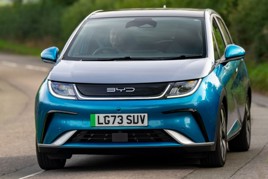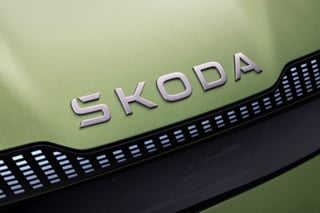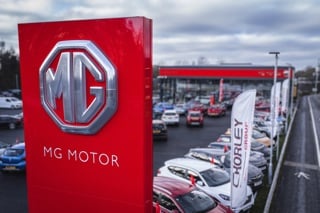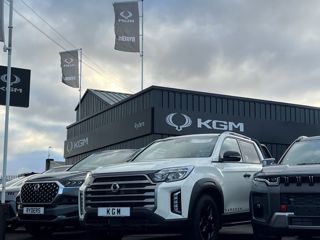The automotive industry is undergoing a transformative period with Chinese electric vehicle (EV) manufacturers firmly setting their sights on the UK and Europe.
A session at AM Live in November invited leading industry experts including former Hyundai chief and industry veteran Tony Whitehorn (right), Bloomberg Intelligence’s global head of automotive research Mike Dean (centre), and Grant Thornton’s head of downstream automotive Owen Edwards to discuss the motivations behind Chinese EV manufacturers targeting these markets, the challenges they face, and their potential impact on the UK dealership community.
 In the realm of electric vehicles (EV), a notable shift is occurring as Chinese manufacturers target the UK and Europe. This strategic move is not merely driven by the pursuit of new revenue streams in regions where the EV market is gaining momentum but also due to China’s domestic market reaching maturity.
In the realm of electric vehicles (EV), a notable shift is occurring as Chinese manufacturers target the UK and Europe. This strategic move is not merely driven by the pursuit of new revenue streams in regions where the EV market is gaining momentum but also due to China’s domestic market reaching maturity.
The automotive industry is undergoing a transformative period with Chinese electric vehicle (EV) manufacturers firmly setting their sights on the UK and Europe.
A session at AM Live in November invited leading industry experts including former Hyundai chief and industry veteran Tony Whitehorn (right), Bloomberg Intelligence’s global head of automotive research Mike Dean (centre), and Grant Thornton’s head of downstream automotive Owen Edwards to discuss the motivations behind Chinese EV manufacturers targeting these markets, the challenges they face, and their potential impact on the UK dealership community.
 In the realm of electric vehicles (EV), a notable shift is occurring as Chinese manufacturers target the UK and Europe. This strategic move is not merely driven by the pursuit of new revenue streams in regions where the EV market is gaining momentum but also due to China’s domestic market reaching maturity.
In the realm of electric vehicles (EV), a notable shift is occurring as Chinese manufacturers target the UK and Europe. This strategic move is not merely driven by the pursuit of new revenue streams in regions where the EV market is gaining momentum but also due to China’s domestic market reaching maturity.
The evolution of the domestic Chinese EV market plays a pivotal role in its global aspirations. Mike Dean, who recently visited China, provides insights into the Chinese EV market, noting, "It's an interesting market because, one, the economy hasn't recovered as strongly as they thought it would do post-COVID and secondly, it's just intensely competitive. You have 91 different brands in China, very much focused on battery electric vehicles and so the price competition is intense.”
Tony Whitehorn, a seasoned industry expert, shed light on this trend, emphasising the need for global expansion due to those shifting dynamics in China’s domestic market. "What's going on in the Chinese market? The Chinese market is softening and therefore, Chinese EV manufacturers fundamentally are looking elsewhere to try and get their revenue.”
Owen Edward agreed: “If you look at Europe it’s a market of 15 million new vehicles every year. UK is the second largest, broadly about 2.3 million units. Why wouldn't you want to be part of that market? That’s the first reason. Second reason, our tariffs are only 10%.”
The spotlight is firmly on Europe, with a particular focus on the UK, renowned for being an open and highly competitive market. However, a significant challenge looms – the right-hand drive configuration. While companies like BYD and Chery boast right-hand drive heritage, it remains a substantial hurdle for many other Chinese manufacturers.
“The engineering in terms of making a right-hand drive car, compared to a left-hand drive car is actually quite considerable,” said Whitehorn. “There's only US, Japan, South America, South Africa, Australia, New Zealand and India that are right hand drive vehicles so unless you're into some of those markets already, it's very difficult to get that that in terms of pure economies of scale.”
Distribution models
Addressing the question of how Chinese EV manufacturers could soon move into the premium and luxury segments, Whitehorn said it was important for Chinese EV manufacturers to initially build brand credibility in the mid-range market as launching with a lower-priced range of models could make it challenging to establish good brand credentials and gain consumer trust. Their strategy therefore is to enter the market with value-for-money offerings before eventually introducing more high-end options.
Mike Dean, who attended the Munich Motor Show, shed light on the impressive products showcased there by Chinese brands. He noted: "Chinese brands are dominating the scene with good products, big screens, and impressive interfaces." However, the challenge arises when considering pricing, as Chinese EVs like the XPeng’s G9 SUV was 72,000 euros competing against the likes of BMW and Mercedes. So they're going to find it very, difficult and it's going to come down to price.”
Dean pointed out MG's success in the UK market was achieved by hitting exactly the right sweet spot in terms of pricing. The MG ZS, the second-best-selling battery electric vehicle in the UK, is priced at an average of £31,000, making it compelling in terms of competitive pricing especially in a country where consumers are not fiercely loyal to specific brands.
Owen Edwards stressed the importance of Chinese manufacturer remaining flexible in adapting to UK market dynamics. "Controlling the sale price, understanding distribution, and absorbing the knowledge of the European market will be crucial for Chinese manufacturers," he stated.
However, the central question remains: which Chinese EV brands are poised to carve out their niche in the UK?
Tony Whitehorn categorises the Chinese EV manufacturing community into state-owned manufacturers like Chery and Dongfeng, private companies like Geely and BYD, and smaller, more agile businesses such as Xpeng and Nio.
 BYD stands out as a profitable and well-established player, which supported by its ownership of the entire EV supply chain can claim the title of the second-largest battery manufacturer globally. Geely and Great Wall Motors also show promise, having garnered recognition and success within China. However, newer entrants, such as Nio and Xpeng, despite their agility, face substantial financial challenges, as highlighted by Whitehorn, who said these manufacturers are losing billions of dollars each year at this moment in time.
BYD stands out as a profitable and well-established player, which supported by its ownership of the entire EV supply chain can claim the title of the second-largest battery manufacturer globally. Geely and Great Wall Motors also show promise, having garnered recognition and success within China. However, newer entrants, such as Nio and Xpeng, despite their agility, face substantial financial challenges, as highlighted by Whitehorn, who said these manufacturers are losing billions of dollars each year at this moment in time.
Mike Dean here underscored the significance of profitability, especially for such newer entrants who lack a profitable Internal Combustion Engine (ICE) business to offset EV losses. Scale is also becoming a critical factor, with BYD's signal success attributed to its substantial production capacity.
Nevertheless, Dean predicts a challenging path for Chinese manufacturers to gain a foothold in the UK: “It is going to be a lot more difficult for Chinese brands to enter the UK market than people think. Profitability is the key so BYD is one of the few companies that has the ammunition to be able to make an entrance into the UK market.”
The winners and losers among Chinese manufacturers will, the panellists agreed, hinge on factors like scale, financial health, and adaptability in a fiercely competitive automotive industry.
Backing the right horses
With the influx of Chinese EV brands, the discussion turned to the challenges faced by dealerships with the panel stressing the importance of due diligence, particularly when considering partnerships with or investments in Chinese EV manufacturers.
When it comes to a dealer picking the right brand, Owen Edwards stressed the need for thorough due diligence of financial health especially cash flow, production scale and long-term viability of potential Chinese partners. "Do your due diligence. Look into the financials, investor relations websites, and don't just rely on the exciting cars. There has to be substance behind it," he said. “Look at the profitability, look at cashflow, look at how many units they're manufacturing. So if they're only manufacturing, let's say 5,000 units a quarter globally. Is that really good enough? Is that really going to be a strong company down the line?”
“Fundamentally,” he said, “you have to get your finance guys out of their office, kick the tyres and say, right, what should we be looking at? Is this one right for us? Because don't forget, you're not going to have that nice aftermarket as you have with standard brands like the Fords, the BMWs, the Audi's etc which means you've got to cover that for a short period of time, say two or three years.”
“Whether it is a dealer network or an agency model, whatever the case may be, fundamentally, you've got to be the right fit for them. They've got to be right fit for you.”
The conversation also delved into the potential impact of punitive tariffs on Chinese EV brands by the European Commission which could follow the US whose protectionist efforts have rebuffed Chinese EV export efforts.
Weighing the implications of such tariffs on the competitiveness of Chinese EVs in the UK market, Edwards said UBS had examined Chinese brand pricing and estimated they could still be up to 25% cheaper than legacy brands. “So that's your first question - is a 25% tariff going to hit the nail on the head?”
The panellists predicted that Chinese EV manufacturers may soon seek to establish manufacturing bases in Europe to overcome tariffs under forthcoming Rules of Origins restrictions with Whitehorn mentioning BYD's interest in Hungary.
However, Mike Dean countered this, arguing “You’ve just got to remember what a cost advantage China has. Wages in many regions in the north are 70% cheaper than in Europe. There's now battery overcapacity in China so battery prices are falling significantly plus you have to consider the subsidies that Chinese government gives. China’s low electricity costs are also going to be very difficult to compete with which is why I’d question whether they'd set up in in Europe.”
Predicting specific casualties within the western car manufacturing community proved a sensitive subject, although the panel anticipated a rationalisation of brands. Edwards here said he expected a rationalisation by western car makers. “I think you'll start to see car companies drawing back and we've seen that with General Motors selling Vauxhall for example. I know that's not because of Chinese brands, but they rationalised their portfolio. We're starting to see others that are walking into commercial vehicles more than into in passenger car vehicles and moving out of the A and B in the C segments and so on and so forth.
“Will there be businesses that is affected by it? Possibly, because at the moment legislation is moving very, very quickly on emission and that is making it very difficult for the current legacy manufacturers to compete with the battery manufacturers.”
The conversation delved into the evolution of business models for Chinese EV manufacturers. Whitehorn suggested that many would start with a franchise model before potentially transitioning to an agency model. The gradual shift would allow for a smoother transition, avoiding a sudden upheaval for both manufacturers and dealers.
“The reason they're going franchise model is firstly, because it's easier. Secondly, it gets the cars off their books very, very quickly. If you're a new manufacturer, you don't really want to be holding loads of stock yourself. You want to try and move that stock quickly onto the dealer network. So therefore, the franchise model is what just about everybody is looking to do. My big question is, is that is that just a Trojan horse?”
While the potential for innovation, technology, and market disruption is evident, the panel agreed that dealerships must be prepared to navigate the evolving landscape with flexibility, due diligence, and a keen understanding of the dynamics shaping the future of electric mobility.
"We're going through unprecedented times in this industry,” Whitehorn said. “We've never had so many different things going on simultaneously and therefore, if I were back in dealership land, I would say I need to be flexible. I need to be open-minded, to look at all the possibilities that are out there and that does mean looking at things like Chinese manufacturers coming into the UK marketplace.”
Login to continue reading
Or register with AM-online to keep up to date with the latest UK automotive retail industry news and insight.




















Login to comment
Comments
No comments have been made yet.